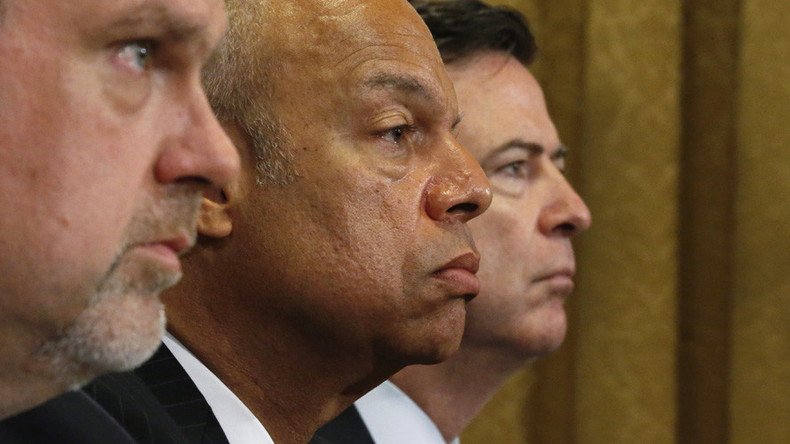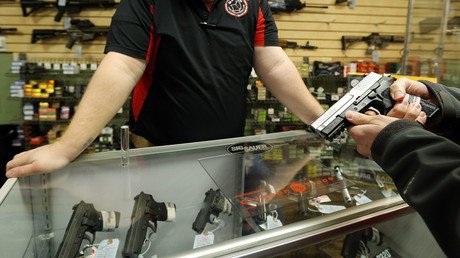1,000 probes in potential lone-wolf attackers in US

The FBI arrested four people this month in order to disrupt ISIS-inspired plots and has 1,000 similar probes underway. The bureau director and others testified on Capitol Hill about fighting Islamic State, from cyberspace to the airports of Cuba.
On Thursday, FBI Director James Comey once again faced questioning on Capitol Hill, this time in front of the House Homeland Security Committee. During this hearing, unlike the one on former Secretary of State Hillary Clinton’s private email server from last Thursday, he was not the only person testifying, the tone was much more cordial and the hearing was a whole lot shorter.
The hearing focused on current threats to the US homeland, especially from radical Islamist terrorists ‒ namely Islamic State (IS, formerly ISIS/ISIL). Representatives also asked Comey, Homeland Security Secretary Jeh Johnson and National Counterterrorism Center Director Nicholas Rasmussen about the federal government’s efforts to counter emerging threats, the danger of foreign-inspired homegrown extremists, the role of global terrorist organizations in their radicalization, and efforts to prevent terrorist infiltration into the United States.
IS turns to the internet
Although the physical territory that IS controls has shrunk, its reach, especially through social media, has grown. The jihadist group has claimed responsibility for recent terror attacks in Bangladesh, Iraq, Saudi Arabia and Turkey, and it has inspired lone-wolf attacks by “homegrown violent extremists” that “remain an unpredictable threat” to the homeland, Rasmussen said in his opening remarks.
“While ISIL’s efforts on the ground in Syria and Iraq remain a top priority” for the National Counterterrorism Center, “we do not judge that there is a direct link between the group’s current battlefield status in Iraq and Syria and the group’s capacity to operate as a terrorist organization with global capabilities. Their external operations capability has been building and entrenching during the past two years, and we do not think battlefield losses alone will be sufficient to degrade completely the group’s terrorism capabilities,” he added.
The widespread reach of IS through the internet and social media “is most concerning as the group has proven dangerously competent at employing such tools in furtherance of its nefarious strategy,” Comey said in his opening statement. The threat from IS propaganda was brought home by Omar Mateen, who shot up a gay nightclub in Orlando, Florida in mid-June, killing 49 people and wounding 53 others, he noted.
IS is using “high-quality, traditional media platforms,” but its main focus has been on social media, which has recently included English-language publications, Comey said. They have “constructed a narrative that touches on all facets of life from career opportunities to family life to a sense of community. The message isn't tailored solely to those who are overtly expressing symptoms of radicalization.” Their recent messages have advocated for lone-wolf attacks against the military, law enforcement and intelligence communities in Western countries.
The FBI has arrested four people “just in this month to disrupt them, people who are moving on that path from consuming” IS propaganda to acting with violence, Comey noted.
Threats to the US are no longer just terrorist-directed, but are inspiring people to self-radicalize, Johnson said. Those attacks are difficult to detect and also occur with little or no notice, making for “a more complex homeland security challenge.” He also noted that law enforcement has different approaches when dealing with communities in which an international terrorist organization is trying to recruit versus a domestic group that is inherently anti-government, such as a white supremacist group, that has a violent approach.
Foreign fighters and access to guns
Two of the biggest concerns for the witnesses are whether IS fighters are able to enter the country and how terrorists ‒ either homegrown or foreign ‒ are able to get their weapons.
Representative John Katko (R-New York) raised concerns about the potential for foreign fighters to enter the US through Cuban airports once commercial flights become available between the two countries begin this fall. He asked Johnson what the Department of Homeland Security is doing to get the Transportation Security Administration and Air Marshals access to Cuban airports, as well as what sort of document verification and other screening tools they will be using in their ten airports of last departure to the US and the training and vetting of their employees.
“Another thing of major concern to me is that Cuban visas are showing up in the Middle East,” Katko said, citing a Washington Post article that he introduced into the hearing record.
Johnson responded that security for flights from Cuba is something he’s “personally focused on.”
He has asked the TSA for assurances that “any last point of departure airport from Cuba satisfies our US screening standards, not just international screening standards,” he said, and that the agency is working to get an agreement to put federal Air Marshals on flights from the country. “And I want to see a senior-level official from TSA headquarters personally go down to Cuba to take a look at security at last point of departure airports,” he added.
Johnson said that DHS is “very focused on last point of departure airports,” specifically in the Middle East region, noting that “we have some challenges there,” ‒ but that “we’re not going to take our eye off the rest of the world, however.”
Ranking Member Bennie Thompson (D-South Carolina) asked Comey about the so-called “Charleston loophole,” which allowed white supremacist Dylann Roof to purchase a gun after the FBI failed to complete his background check within three days. He then used that weapon to kill nine people at a South Carolina church.
Comey noted that current laws allow for gun dealers to complete a sale if the FBI hasn’t completed the background check within three days, which many smaller retailers choose to do for their bottom lines. He called on Congress to pass either of two bills ‒ one proposed by Senator Dianne Feinstein (D-California), the other by Senator Susan Collins (R-Maine) and others ‒ that would give the US attorney general the discretion to prevent sales to people who are on a law enforcement watch list, usually the no-fly list, as long as there is and adjudication process to remove themselves from such a list. Similar bills failed in the wake of the Orlando terror attack.
Johnson also called for Congress to work together in a bipartisan way to make it more difficult for terrorists to get guns through legislation that contains an adjudication process. “We have to face the fact that sensible gun control is not just about public safety, but also national security,” he added.
Cybersecurity and terrorism
Comey once again called on Congress to legislate a back door to encryption, a request he specifically focused on in the wake of San Bernardino. Such an encryption backdoor is necessary, he said, because “virtually every national security and criminal threat the FBI faces is cyber-enabled in some way,” through hacking, ransomware and other malware attacks.
FBI takes encryption fight with Apple to Congress #AppleVsFBIhttps://t.co/9LkuK0NFNppic.twitter.com/PUXdjaxfnq
— RT America (@RT_America) February 25, 2016
“Terrorists’ exploitation of encrypted platforms presents serious challenges to law enforcement’s ability to identify, investigate, and disrupt terrorist threats,” he said. “When changes in technology hinder law enforcement's ability to exercise investigative tools and follow critical leads, those changes also hinder efforts to identify and stop terrorists who are using social media to recruit, plan, and execute an attack in our country.”
If the FBI can’t get access to “significant evidence” on a suspect’s digital platforms, it may make “the difference between an offender being convicted or acquitted,” Comey continued. “If we cannot access this evidence, it will have ongoing, significant impacts on our ability to identify, stop, and prosecute these offenders.”














